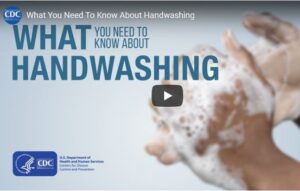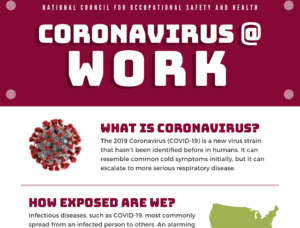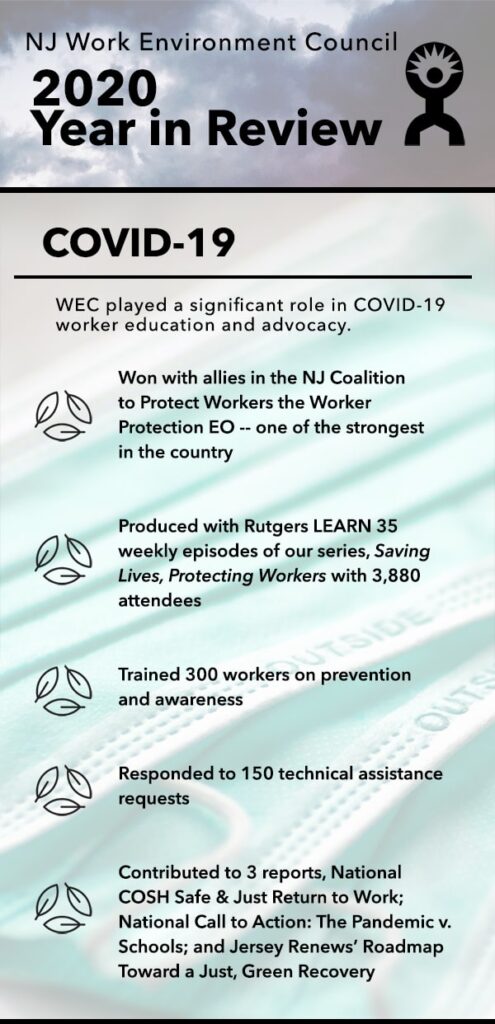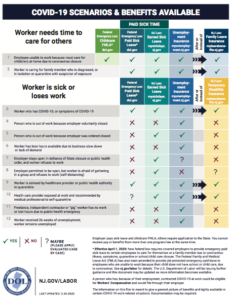COVID-19 Resources
What is COVID-19?
The most recent coronavirus, COVID-19, is a new strain of virus that hasn’t been identified before in humans. The COVID-19 virus is a respiratory pathogen that is highly contagious, and it is far more lethal than the flu virus.
Some symptoms of coronavirus include – fever, cough, body aches and tiredness and they can worsen and cause pneumonia, fluid in the lungs that leads to shortness of breath. The COVID-19 illness is more severe than the flu, and the chance of dying from it is greater than the seasonal flu, estimates up to 30x greater risk of death. COVID-19 has been able to spread from person to person very easily and requires an immediate response to protect workers and the general public.
The best way to prevent illness is to avoid being exposed to this virus. Some recent studies have suggested that COVID-19 may be spread by people who are not showing symptoms. The virus is thought to spread mainly from person-to-person, between people who are in close contact with one another (within about 6 feet), through respiratory droplets produced when an infected person coughs, sneezes or talks because these droplets can land in the mouths or noses of people who are nearby or possibly be inhaled into the lungs.
Protect Yourself!
Steps to Take to Protect Yourself
Below are some steps you can take to protect yourself at work or in your daily life. This is not a comprehensive list. It is important to note, as more is learned about COVID-19, the Center for Disease Control and Prevention (CDC) continues to update their guidance on how to protect yourself. For the most recent updates, visit the CDC website.
- Wear a mask to protect yourself and others and stop the spread of COVID-19. Wear your mask over your nose and mouth and secure it under your chin. Fit the mask snugly against the sides of your face, slipping the loops over your ears or tying the strings behind your head.
- Stay at least 6 feet (about 2 arm lengths) from others who don’t live with you.
- Avoid crowds. The more people you are in contact with, the more likely you are to be exposed to COVID-19.
- Avoid poorly ventilated spaces.
- Wash your hands often. If soap and water are not readily available, use a hand sanitizer that contains at least 60% alcohol.
- Monitor health daily.
- Get Vaccinated to Protect Against COVID-19
- Clean and disinfect objects and surfaces you touch often. Use cleaning products as directed.
Employers should follow the MOST protective guidance and standards issued by state or federal agencies. If guidance contradicts each other, the MOST protective should be implemented.
COVID-19 Weekly Updates: Saving Lives, Protecting Workers
In this weekly series, we will hear from and talk with public health experts, government officials, medical personnel, front-line workers and worker representatives about the latest developments in the fight against COVID-19. The series is sponsored by WEC, Rutgers Learn and Jersey Renews and airs on Tuesday @ 12pm. Want to receive weekly series emails, sign up here.
Past Webinar Summaries
July 21: Protecting and Celebrating Facility and Manufacturing Workers During Covid-19
This week’s topic, Protecting and Celebrating Facility and Manufacturing Workers During Covid-19 welcomed a panel of guests who represent property service, essential manufacturing, and facility operations workers who have worked hard to keep public and private buildings functional during the pandemic.
Aaron Jones and Carla Thomas, Service Employees International Union, Local 32BJ (SEIU); Mike Fisher, Sub-District Director, United Steelworkers (USW); and Frank James, Financial Secretary, International Union of Operating Engineers, Local 68 (IUOE) spoke to the occupational safety and health challenges confronting workers during the COVID-19 health crisis.
Our panelists shared their members’ struggle to access and maintain a stable supply of PPE as well as grave […]
July 14: Student Health, Worker Safety, and Funding Challenges for Higher Education in a COVID-19 World
This week’s topic focused on student and worker safety in the tumultuous and ever-changing landscape of higher education. We heard from three inspiring women who have been organizing higher education faculty and staff across departments and sectors for conditions where every single worker can work safe and receive just compensation.
Christine O’Connell, President of the Union of Rutgers Administrators (
June 30: Update on the Updates
This week’s topic, Update on the Updates, we checked back in with several of our previous webinar participants for a roundtable discussion. We were joined by Marcia Kleinz, Field representative for Higher Education, NJEA, Barry Kushnir, President, IFPTE Local 194, and Hudson County Central Labor Council and Nancy Miller, membership assistance program coordinator, UFCW Local 1262. They gave updates on the continued challenges COVID-19 presents for their members in higher education, Turnpike toll takers and retail. Nancy discussed UFCW’s ongoing campaign to support Covid 19 Hazard Pay for essential grocery store workers, and encouraged attendees to let management at their local union supermarkets know […]
June 23: Working Parents Need Child Care: An Update on the Reopening
This week 110 participants joined the discussion focused on access to affordable quality childcare. As child daycare and early childhood programs reopen, we must address the complex issues surrounding capacity, safety, staffing, economic viability, and program effectiveness under new, ever changing guidelines.
Debra Lancaster, Executive Director, Rutgers Center for Women and Work co-moderated the following speakers:
Meghan Tavormina. President of the New Jersey Association for the Education of Young Children and the Executive Director of the Learning Path in Chatham. Ms. Tavormina highlighted the importance of childcare as our NJ families head back to work and our childcare centers reopen. Meghan spoke about […]
June 16: Public Health, Worker Safety, and Funding Challenges for Public Transportation in a COVID-19 World
This week’s COVID-19 update focused on the NJ public transit system which puts hundreds of thousands of commuters and thousands of transportation workers at risk for sustained, exposure to the coronavirus and other pathogens, and what is needed to reduce risk.
We had the opportunity to hear from Nick Sifuentes, Executive Director of Tri-State Transportation Campaign and he spoke about what riders need to feel safe in order to continue to use public transportation and how to help make public transportation as safe and effective as possible during the pandemic.
Our second panelist, Orlando Riley, Chairman, Amalgamated Transit Union, NJ State Council gave insight into issues surrounding […]
The COVID-19 webinar series is sponsored by



Benefits for Workers
NJ Department of Labor and Workforce Development Resources
- What NJ Workers Need to Know about the Families First Coronavirus Response Act Factsheet
- NJ Division of Unemployment: https://myunemployment.nj.gov/
- Guidance for Self-Employed Individuals Filing a Pandemic Unemployment Assistance Claim and FAQs
- NJ Family leave Insurance: https://myleavebenefits.nj.gov/labor/myleavebenefits/worker/fli/index.shtml
- NJ Earned Paid Sick Leave: https://www.nj.gov/labor/worker-protections/earnedsick/law.shtml
- NJ Temporary Disability Insurance: https://myleavebenefits.nj.gov/labor/myleavebenefits/worker/tdi/index.shtml
Federal Paid Sick Leave and CARES act expansions and stimulus
- US Department of Labor: Families First Coronavirus Response Act: Employee Paid Leave Rights



